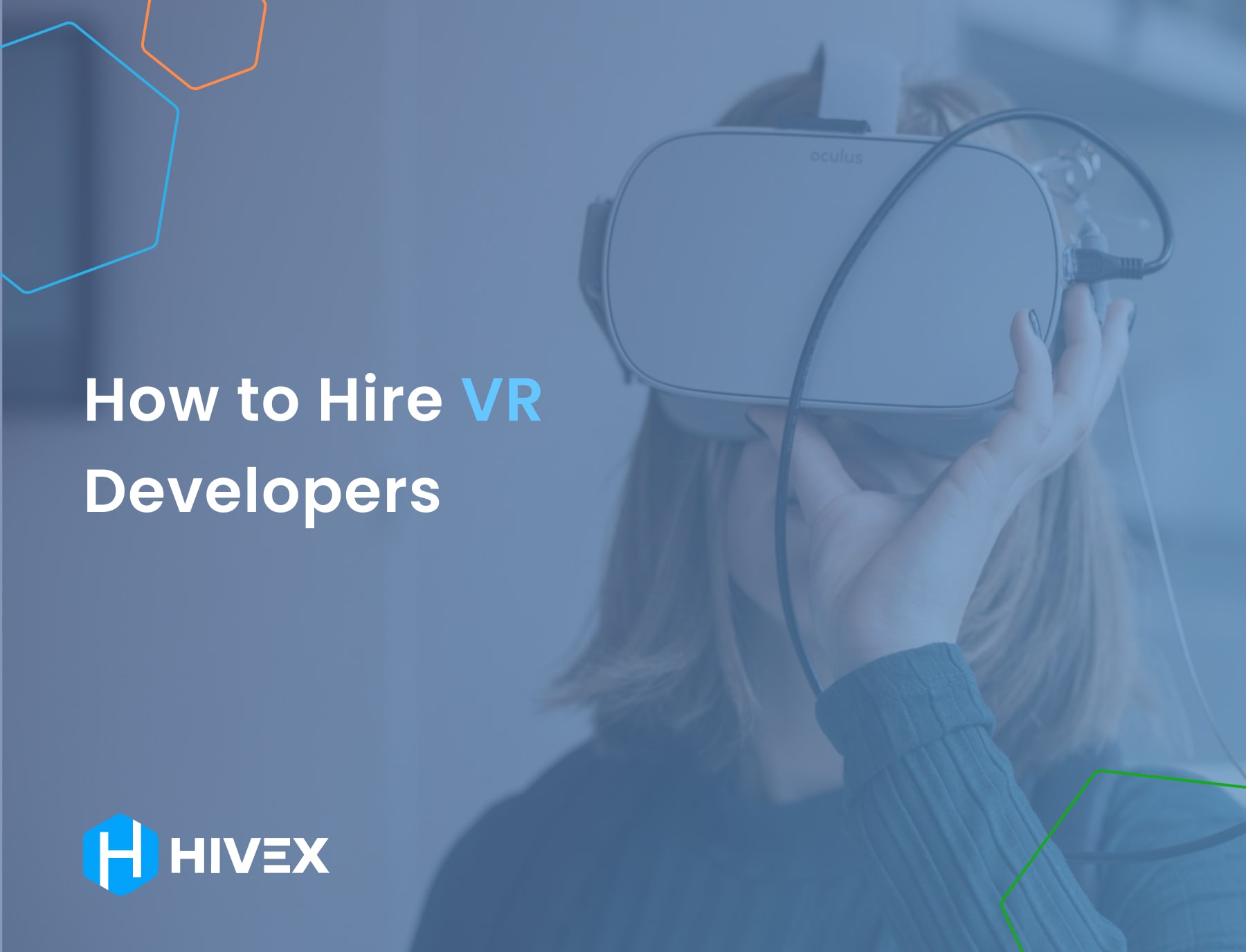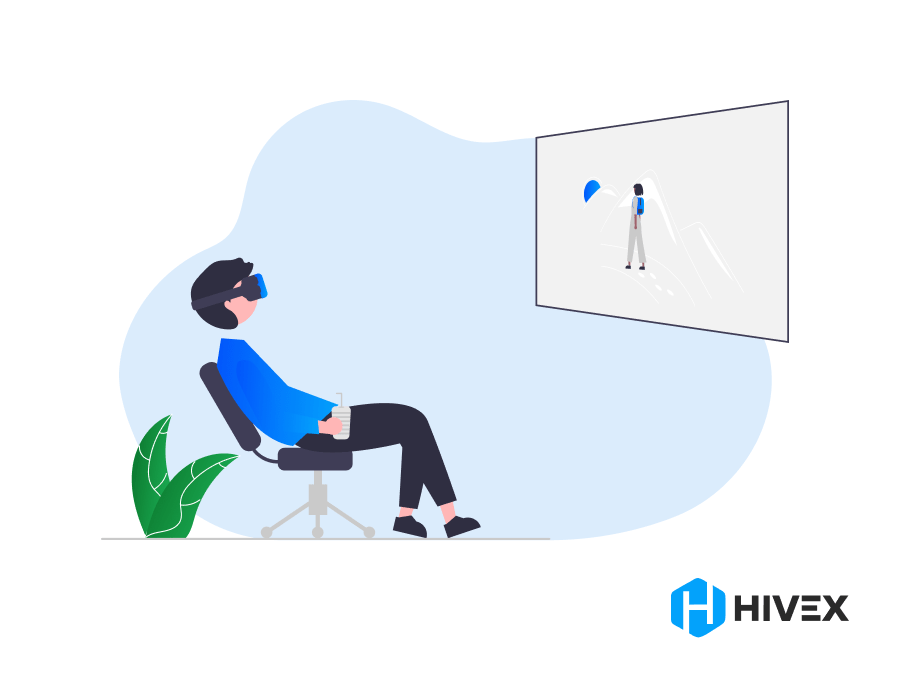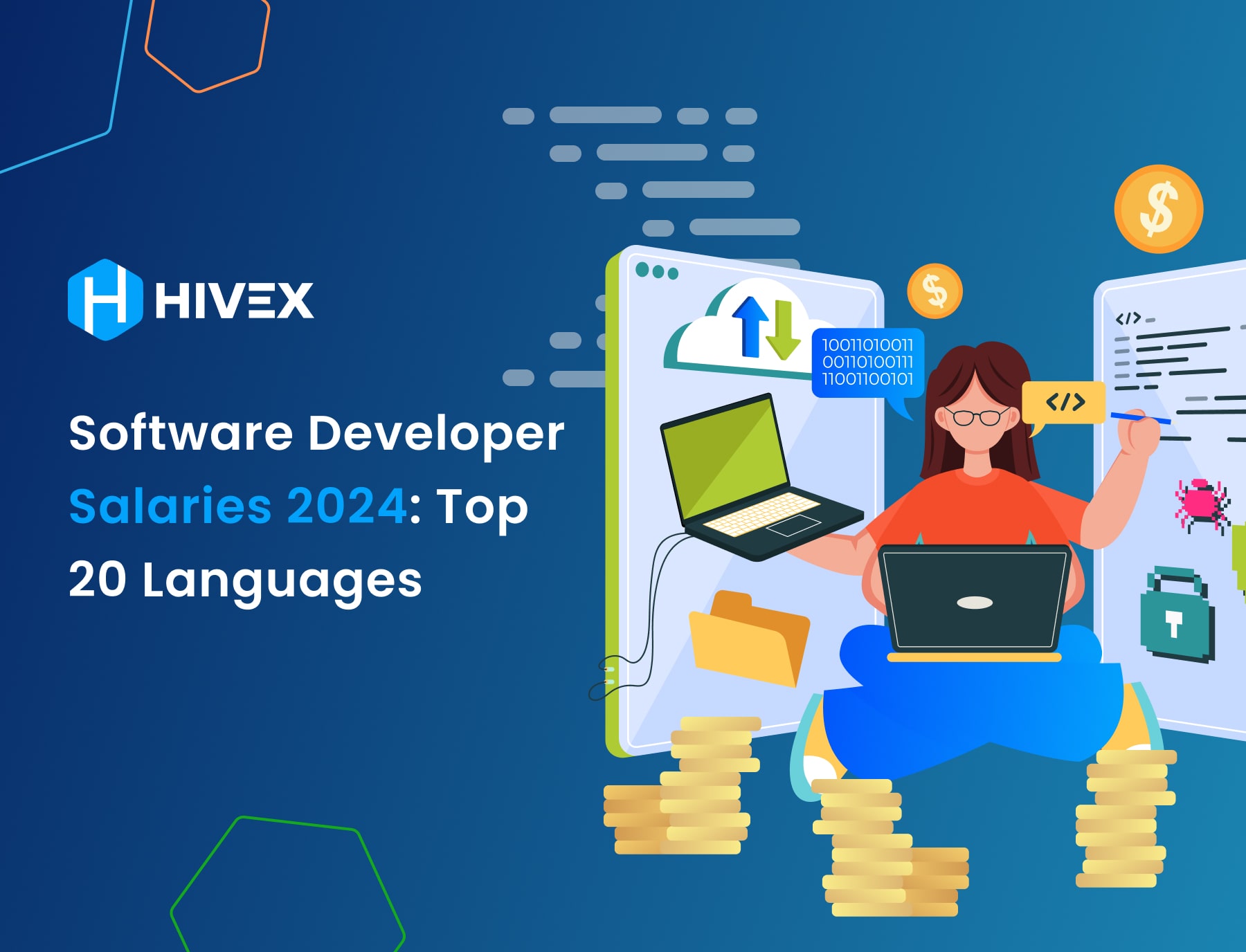How to Hire VR Developers – Step By Step Guide

Virtual Reality (VR) technology has rapidly emerged as a powerful tool in the business landscape. Its ability to provide immersive and interactive experiences opens up new possibilities for industries across the board. To harness the full potential of virtual reality, companies must hire skilled VR developers with the necessary expertise and experience.
In this article, we will explore the role of virtual reality in modern business and provide valuable insights on how to hire the right VR developers for your organization.
The Role of VR in Modern Business
Virtual reality has emerged as a revolutionary technology that transforms modern business.
The ability to create immersive and interactive digital environments has opened up new opportunities for businesses to enhance their operations, improve customer experiences, and drive innovation.
VR development has become a key focus for many companies, as they recognize the potential benefits it can bring to their bottom line.

Training & Education
Traditional training methods often involve costly and time-consuming processes, such as organizing physical training sessions or sending employees to off-site locations.
However, with virtual reality, businesses can create virtual training environments that simulate real-life scenarios, allowing employees to practice and learn in a safe and controlled environment. This not only saves time and money but also enhances the effectiveness of training programs by providing a more engaging and immersive experience.
Product Development & Design
Virtual reality technology enables businesses to create virtual prototypes of their products, allowing them to visualize and test different design concepts before investing in physical prototypes.
This not only speeds up the product development process but also helps businesses identify potential design flaws or improvements early on, saving them from costly rework or recalls.
Moreover, virtual reality can also be used to showcase products to customers in a more interactive and engaging manner, enhancing the overall customer experience.
Marketing & Advertising
Businesses can leverage virtual reality to create immersive experiences for their customers, which can help them stand out from their competitors.
For example, a real estate company can use virtual reality to create virtual tours of properties, allowing potential buyers to explore the space as if they were physically there.
Similarly, retailers can use VR to create virtual stores where customers can browse and purchase products from the comfort of their own homes.
By using VR in their marketing efforts, businesses can capture the attention of their target audience and leave a lasting impression.
Collaboration and Communication
Virtual reality has the potential to revolutionize collaboration and communication within businesses.
With the rise of remote work and global teams, it has become increasingly important to find ways to facilitate effective collaboration despite geographical barriers. VR provides a solution by creating virtual meeting spaces where team members can gather, interact, and work together as if they were in the same room.
This not only improves communication and teamwork but also enhances productivity by eliminating the need for travel or complicated video conference setups.
Virtual reality has become an integral part of modern business, offering numerous benefits across various areas.
From training and education to product development, marketing, and collaboration, VR has the power to transform how businesses operate and engage with their stakeholders.
As VR development continues to advance and become more accessible, it is expected that its role in business will only continue to grow in significance.

Hard Skills to Look for in Virtual Reality Developers
Virtual reality developers should possess the following technical skills and expertise:
1. Proficiency in 3D Programming
One of the fundamental skills for any virtual reality developer is a strong foundation in 3D programming. This includes knowledge of programming languages such as C# and C++, as well as expertise in using software development kits (SDKs) like Unity Engine and Unreal Engine.
With the ability to create lifelike virtual environments, implement realistic physics, and optimize performance, 3D programming skills form the backbone of immersive virtual reality experiences.
2. Knowledge of 3D Mathematics
To create stunning visual effects and realistic interactions within virtual environments, VR developers must have a solid understanding of 3D mathematics.
Concepts such as vector math, linear algebra, and trigonometry are essential for tasks like calculating object positions, handling rotations, and implementing collision detection.
Mastery of 3D mathematics empowers virtual reality developers to bring their creative visions to life in a dimensionally accurate manner.
3. Expertise in VR and AR SDKs
Virtual Reality and Augmented Reality (AR) software development kits (SDKs) provide the necessary tools and frameworks to build immersive experiences.
Skilled VR developers should have hands-on experience with popular SDKs like Oculus, HTC Vive, or Google Cardboard.
By leveraging the capabilities of these SDKs, developers can create seamless, interactive VR applications that captivate users and provide them with a truly immersive experience.
4. User Interface Design Skills
Creating an intuitive and user-friendly interface is crucial for any VR application.
Virtual reality developers who possess strong user interface (UI) design skills can craft interfaces that enhance user engagement and make interactions within virtual environments more natural and intuitive.
A deep understanding of UX principles, combined with creativity, enables developers to design interfaces that guide users seamlessly through the virtual reality experience.
5. Proficiency in Spatial Audio
Sound plays a vital role in creating realistic and immersive VR experiences.
Virtual reality developers should have expertise in spatial audio, which involves using audio techniques that mimic how sound behaves in real-world environments.
By accurately replicating sound positioning and realistic audio effects, developers can enhance the sense of presence and immersion for users, creating a truly captivating VR experience.
6. Knowledge of 3D Modeling Tools
VR developers often need to create or modify 3D models to populate their virtual environments.
Proficiency in 3D modeling tools such as Blender, Maya, or 3DS Max is essential for tasks like object creation, character modeling, and environment design.
With expertise in 3D modeling tools, developers can bring their creative ideas to life and build visually stunning VR experiences.
7. Graphics Programming Skills
Optimizing graphics performance and ensuring smooth rendering are critical aspects of VR development.
VR developers should have a strong understanding of graphics programming and optimization techniques. This includes knowledge of shaders, rendering pipelines, and texture mapping.
By implementing efficient graphics programming practices, developers can deliver high-quality, visually stunning VR experiences that run smoothly on various VR platforms.
8. Familiarity with Version Control
Collaboration is often a part of VR development, making version control an essential skill for developers.
Proficiency in version control systems such as Git enables developers to effectively manage codebase, track changes, and collaborate seamlessly with other team members.
Version control ensures that the development process remains organized, making it easier to iterate, debug, and maintain VR applications.

Soft Skills to Look for in Virtual Reality Developers
Soft skills play a crucial role in ensuring the success of VR projects and maintaining effective collaboration within development teams.
1. Communication Skills
Clear and effective communication is essential for virtual reality developers. They must be able to articulate their ideas, requirements, and project progress to both technical and non-technical stakeholders.
For example, a VR developer might need to explain the intricacies of shader development in a VR project to marketing teams or investors. Effective communication helps foster collaboration, ensures everyone is on the same page, and prevents misunderstandings that can lead to costly mistakes.
Virtual reality developers with strong communication skills can effectively convey complex technical concepts in simple terms, making them valuable assets to any team.
2. Problem-Solving Abilities
Virtual reality development often involves solving complex problems, such as optimizing VR environments for different VR headsets or troubleshooting game programming issues. A skilled software engineer in VR might be faced with a challenge like ensuring high performance across various mobile devices.
Developers who possess strong problem-solving abilities can quickly analyze problems, identify root causes, and propose effective solutions. Their capability to navigate through issues in VR programming, like reducing latency for a better user experience, is vital for the success of virtual reality projects.
3. Creativity and Innovation
Virtual reality experiences aim to transport users to innovative and imaginative worlds. Consider a VR developer working on an augmented reality application for educational purposes, who comes up with an interactive, historical virtual tour.
Their creativity and innovative approach to blending extended reality with learning make the application both informative and engaging. By infusing their creativity into their work, these developers can captivate users and deliver memorable experiences that push the boundaries of virtual reality applications.
4. Adaptability and Flexibility
Virtual reality technology is rapidly evolving, demanding developers to be adaptable and flexible. A developer might need to shift from traditional game development to virtual reality game development, requiring them to stay abreast of the latest industry trends.
Being adaptable also means transitioning smoothly between different software development tools, such as moving from Unity to Unreal Engine for specific VR project requirements. This adaptability is crucial for staying relevant and innovative in the VR industry.
5. Collaboration and Teamwork
Effective collaboration and teamwork are essential in VR app development. For instance, developing a complex VR game often involves a diverse team including game designers, audio engineers, and programmers.
A developer skilled in game programming and with strong teamwork skills can effectively collaborate with artists for asset creation, ensuring the VR game is both visually stunning and functionally sound.
6. Time Management and Organization
Time management and organization are key in the demanding field of VR development. Developers often work on multiple aspects of a virtual reality project, such as coding, testing, and debugging simultaneously.
Those proficient in project management can effectively prioritize tasks and manage deadlines, ensuring rapid VR app development cycles. This skill is particularly crucial when working with clients who have tight schedules for VR project delivery.
In VR programming and software development, soft skills are as important as technical capabilities. When hiring virtual reality developers, assessing their communication, problem-solving, creativity, adaptability, collaboration, and project management skills is crucial.
These soft skills, combined with their technical acumen, enable developers to effectively navigate the complexities of virtual reality technology and create immersive, innovative, and successful virtual reality applications and games.
Prioritizing these skills in your hiring process ensures your development team is well-rounded and capable of excelling in the ever-evolving VR industry.
You may also like: Strategies for Managing Remote Development Teams

Virtual Reality Developer Hiring Process
Building a skilled VR development team requires a well-defined hiring process.
To start, it is crucial to create a detailed job description including the required technical skills, experience level, and educational qualifications. Sharing this information with potential candidates will attract those who possess the desired expertise.
Step 1
The first step in the hiring process should focus on outlining the specific requirements for the VR developer role.
This involves detailing not just the technical skills needed, such as proficiency in 3D modeling or familiarity with VR hardware, but also the soft skills, like effective communication and teamwork capabilities.
Highlighting the necessity for a candidate to be adept in both areas ensures that the applicants understand the dual nature of the role, particularly in VR software and app development.
Step 2
Once you have received applications, shortlisting candidates based on their qualifications and experience is the next step.
This phase should involve a thorough review of each applicant’s background to ensure they meet the set criteria, especially those with experience in VR technologies.
Consider asking candidates to submit their portfolios or complete a VR-related task to assess their skill level. This practical assessment will give you a clearer idea of their capabilities in creating VR content and their problem-solving skills in real-world scenarios.
Step 3
Conducting interviews is a crucial part of the hiring process.
In addition to assessing technical skills, use interviews as an opportunity to gauge a candidate’s creativity, problem-solving abilities, and cultural fit within your organization, especially their experience in meeting specific business needs through VR technologies.
During the interview, delve into their past projects and experiences, focusing on their contributions and the impact they made. Behavioral questions can also shed light on the candidate’s approach to teamwork and their ability to handle challenges. It’s essential to understand how they operate in a team setting and their approach to overcoming obstacles.
Step 4
Finally, after selecting the most promising candidates, conducting reference checks and background screenings helps you validate their qualifications and previous work experiences.
This final vetting process is vital to ensure that their documented achievements and experiences are genuine and that they are a reliable addition to your team, especially as part of your development team.
Additional Tips
When crafting a job description, it’s beneficial to highlight any specific VR platforms or tools that the candidate will be working on.
Whether it’s Unity, Unreal Engine, or proprietary software, specifying these details can attract candidates with experience in the relevant technologies. Stating specific platform preferences will also help streamline the applicant pool to those who are truly qualified.
Consider including information about the projects the virtual reality developer will be involved in.
Mentioning the opportunity to work on cutting-edge VR simulations, immersive experiences, or interactive training modules can pique the interest of talented VR talent looking for innovative projects.
Detailing the types of projects can also assist candidates in visualizing their potential roles and contributions within your company, making the position more appealing to those looking to push boundaries in the virtual reality field.
This comprehensive approach ensures you not only attract qualified candidates but also select a developer who aligns with your company’s vision and the specific needs of your VR projects.
Read also: How To Onboard New Developers [+Template]

Critical Considerations When Hiring VR Developers
While technical skills are essential, there are several other considerations to keep in mind when hiring VR developers.
Industry-Specific Experience
A VR developer with experience in your specific industry will better understand the unique challenges and needs of your business. For instance:
- In gaming: They would have expertise in creating engaging and immersive gaming experiences.
- In education: They might be skilled at developing interactive learning modules.
- In healthcare: Experience creating VR simulations for training medical professionals.
Adaptability and Passion for Learning
With VR development being a rapidly evolving field:
- Candidates should show a strong commitment to staying updated with machine learning and artificial intelligence advancements in VR solutions.
- Demonstrate enthusiasm for exploring new virtual reality projects and VR technologies.
Portfolio Review
Assessing a candidate’s portfolio is critical for understanding their capability in VR development:
- Diversity in projects indicates their versatility in working across different platforms.
- Look for examples of asset creation, performance optimization, and computer science skills.
- Assess their proficiency in creating realistic and detailed VR environments.
Communication Skills
Vital for collaborative VR projects:
- Look for developers who can effectively communicate and work in a diverse team environment.
- Their ability to articulate complex VR concepts to team members from different backgrounds.
Problem-Solving Abilities
Key for solving problems in VR development:
- Probe their approach to troubleshooting and resolving technical challenges during the interview.
- Assess their ability to think creatively and come up with innovative solutions.
Cultural Fit
Important for integrating into the team and contributing to virtual reality experiences:
- Compatibility with your company’s ethos and a shared vision for VR solutions.
- Assess how they’ve collaborated with others on VR projects, especially in a diverse team setting.
Technical Versatility
Critical for VR development:
- Experience with various programming languages and VR environments.
- Familiarity with different platforms, including extended reality and immersive technologies.
- Ability to balance virtual reality experience with tech skills in areas like asset creation and performance optimization.
By integrating these considerations and keywords, you ensure a comprehensive approach to hiring VR developers who are not only technically proficient but also aligned with your business objectives, capable of enhancing your VR solutions and contributing significantly to your virtual reality projects.
You may also like: Software Engineer Performance Review Examples

Cost-Benefit of Hiring VR Talent
ROI takes center stage when analyzing the value of hiring VR talent. By carefully considering the potential return on investment, organizations can make an informed decision.
Evaluating the cost-benefit of hiring VR talent requires a comprehensive assessment of both the initial investment and the potential benefits.
By considering increased sales, improved employee training outcomes, enhanced customer satisfaction, and long-term cost savings, organizations can make an informed decision.
Although hiring skilled VR developers requires financial resources, the value they bring can far outweigh the costs.
But VR benefits go far beyond just financial gains. Let’s explore why investing in VR talent is both a wise decision and an opportunity to position your organization as an innovative industry leader.
Related reading: Capacity Planning: A Comprehensive Guide
Boosting Sales and Customer Satisfaction
VR has the power to transform the way businesses engage with their customers. Immersive VR experiences can generate excitement and drive customer interest, ultimately leading to increased sales.
Imagine allowing potential customers to virtually experience a product before making a purchase. VR can create an unprecedented level of realism, enabling customers to make informed decisions and enhancing their overall satisfaction.
Revolutionizing Employee Training
Training employees can be a costly and time-consuming endeavor. By leveraging virtual reality technology, organizations can streamline their training processes while saving valuable resources.
Skilled VR developers can create immersive simulations that mimic real-life scenarios, allowing employees to practice and hone their skills in a virtual environment. This eliminates the need for expensive physical training facilities and reduces training time, increasing efficiency and productivity.
Gaining a Competitive Advantage
Staying ahead of the competition is a constant challenge for any organization. By investing in VR talent, you position yourself as an innovative industry leader. Skilled VR developers bring fresh perspectives and creativity to your projects, enriching your team’s capabilities.
This competitive edge can attract top talent that is eager to work with cutting-edge tools and techniques. In a landscape where talent acquisition is a key differentiator, having a team experienced in the latest VR technologies can give your organization a significant advantage.
Long-Term Cost Savings
While the initial investment in VR talent may seem daunting, it can lead to long-term cost savings. Creating immersive training simulations eliminates the need for costly physical training facilities, saving valuable resources over time.
Additionally, VR technology enables remote collaboration, reducing travel expenses and saving valuable time. By considering these additional benefits alongside the initial investment, organizations can make a comprehensive assessment of the cost-benefit of hiring VR talent.

The Future of Game Development with VR
Virtual Reality has revolutionized the way we experience games. With its immersive technology, VR has taken game development to new heights, offering players a whole new level of engagement and excitement.
But what does the future hold for the games industry with VR?
The games industry has always been at the forefront of technological advancements, constantly pushing the boundaries of what is possible. Virtual reality is no exception.
With the ability to transport players into a virtual world, VR has opened up a whole new dimension of game development possibilities. From intense first-person shooter games to breathtaking virtual exploration, VR has the power to create VR apps that were once unimaginable.
One of the key areas where virtual reality is making a significant impact is in game design. Developers now can create VR apps that feel incredibly real and believable.
By leveraging virtual reality technology, they can design immersive environments that react to the player’s movements and actions, offering a level of interactivity that was previously unprecedented.
This level of immersion not only enhances the gameplay experience but also allows developers to tell compelling stories in a way that captivates players on a whole new level.
In addition to game design, virtual reality is also transforming the way games are played. With a VR headset, players can now step into the shoes of their favorite characters and experience the game from a first-person perspective.
This not only adds a new layer of immersion but also enhances the sense of agency and control. Imagine swinging a sword or casting a spell with your own hands, or physically ducking behind cover to avoid enemy fire.
Virtual reality brings a level of physicality to game development that was previously reserved for the real world, and this has the potential to revolutionize the way we interact with games.
But the future of game development with VR goes beyond just immersive experiences. VR has the power to create social and collaborative gaming environments. With multiplayer VR games, players can interact with friends and strangers alike, fostering a sense of community and connection.
This opens up exciting opportunities for cooperative gameplay and competitive experiences, allowing players to challenge each other in ways that were never before possible.
As technology continues to evolve, the future of game development with VR is only set to become more exciting. The advancement of hardware and software will enable even more realistic and immersive experiences, blurring the lines between the virtual and real worlds.
From improved graphics and motion tracking to haptic feedback and augmented reality integration, the possibilities for VR in game development are virtually limitless.
The future of game development with VR is a promising one. With its immersive technology and endless possibilities, VR has the potential to revolutionize the games industry.
From enhanced game design to transformative gameplay experiences, VR is reshaping the way we play and engage with games. As technology continues to progress, we can expect even more exciting and innovative developments in the world of VR gaming.
Conclusion
The journey to hiring a virtual reality developer is a critical step towards innovating and elevating your business in today’s technology-driven market. These developers are visionaries who can transform your business landscape through immersive VR app development and augmented reality applications.
When you’re on the lookout for a virtual reality developer, consider not just their technical prowess in computer science but also their ability to craft solutions that resonate with your audience. A developer with extensive experience in both VR and mobile apps is a valuable asset, as they bring a wealth of knowledge and adaptability to the table.
Their expertise is crucial in creating VR apps that are not only innovative but also user-friendly and aligned with your business objectives.
The integration of virtual reality and augmented reality applications into mobile apps represents a new frontier in digital interaction. As you seek developers, prioritize those with a portfolio that showcases their skill at merging these technologies. This combination is particularly vital as businesses strive to offer unique, engaging experiences to their customers.
It’s essential to recognize that VR app development is an investment in your company’s future. A virtual reality developer with over a decade of experience brings more than just technical skills – they bring a depth of understanding of how VR can be effectively utilized in different sectors.
Whether it’s for training, marketing, or product development, their insights can help you leverage VR to its full potential.
The selection process should focus on identifying a virtual reality developer who can highlight key features in mobile apps, enhancing both functionality and user engagement.
Look for a professional who understands the balance between aesthetic appeal and practical application, ensuring that your VR solutions are not only technologically advanced but also appealing and intuitive for end-users.
The ideal virtual reality developer embodies a blend of creativity, technical skill, and practical experience. They should have the ability to develop VR apps that are both innovative and aligned with your business goals.
Their contribution to VR app development and augmented reality applications can take your business to new heights, offering unique experiences that engage your audience.
Remember, hiring a developer with extensive experience and a knack for highlighting key features in your VR solutions will be instrumental in your journey toward technological advancement and market leadership.
For the Curious: AI Engineer Job Description Overview


